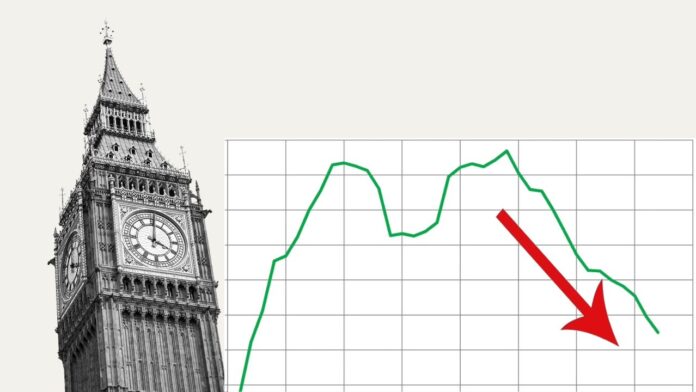British policymakers are now on high alert for a potential recession, as a significant economic indicator has revealed that the UK is caught in a broader downturn in private sector activity across Europe.
This unsettling development suggests that the recent increase in interest rates is prompting a swift deceleration in economic growth, causing inflation to be stifled. The most recent monthly assessments of business health paint a concerning picture, showing a decline in performance for both the UK’s services and manufacturing sectors. This performance slump is the most severe since the Covid-induced lockdown back in early 2021.
The challenges facing the UK are not isolated, as similar issues are being experienced in the eurozone. In this region, economic activity has plunged to its lowest point since November 2020. Notably, Germany, which boasts the largest economy within the eurozone, is bearing a particularly heavy brunt from the drop in demand for its manufactured goods.
The United States has managed to maintain a relatively stronger performance compared to Europe. However, even the largest global economy is displaying signs of strain. In August, economic activity in the US slowed down considerably, approaching levels that resemble stagnation. This marks the lowest point in the past six months.
The warnings regarding potential future issues have been raised through a series of surveys conducted among purchasing managers. These surveys are highly regarded as reliable indicators of upcoming economic trends, with a benchmark of 50 used to distinguish between growth and contraction.
In the UK, the purchasing managers’ index (PMI) developed by S&P and the Chartered Institute of Procurement and Supply demonstrated a notable decline. The index dropped from 50.8 in July to 47.9 in August. Within this, the service sector’s activity fell from 51.5 to 48.7, while the manufacturing PMI fell from 45.3 to 42.5.
Jennifer McKeown, who serves as the chief global economist at Capital Economics, shared her insight on the matter. She expressed that the preliminary PMI data from August aligns with their perspective that both the eurozone and the UK might experience a recession in the third quarter. Furthermore, this data implies that the growth rate in the US is currently minimal.
McKeown also pointed out that considering the gradual decline in output prices, these surveys strongly suggest that we are either at or very close to the peak in monetary tightening cycles.
According to Chris Williamson, who holds the position of chief business economist at S&P Global Market Intelligence, the initial PMI survey conducted for August points to a potential moderation in inflation in the coming months. However, it also highlights that the efforts to combat inflation are carrying a significant burden in the form of increased risks of recession.
The data strongly suggests that the economy is headed for a renewed contraction. This is evident as the manufacturing sector experiences a more pronounced downturn, and the service sector’s initial rebound appears to be losing steam. Based on the survey’s indications, there’s a likelihood of GDP shrinking by around 0.2% during the third quarter so far.
Williamson noted that companies are grappling with multiple challenges, including the impact of the UK’s cost of living crisis, decreased demand for exports, rising interest rates, and uncertainties surrounding the economic outlook. As a result, these firms are finding it difficult to raise prices, leading to the projection that inflation could ease from its current level of 6.8% to around 4% in the months ahead.
Furthermore, there’s a noticeable decrease in hiring during August, indicating that the labor market is losing momentum. This is likely to result in reduced wage pressures. While the possibility of another interest rate increase in September remains on the table, the August PMI data is contributing to discussions about whether interest rates might soon reach their peak.
Turning to the eurozone, the PMI survey conducted by Hamburg Commercial Bank (HCB) paints a similar picture. The overall business activity index slipped from 48.6 in July to 47.0 in August. The services PMI saw a decline from 50.9 to 48.3, while the manufacturing PMI experienced a slight uptick from 42.7 to 43.7.
Cyrus de la Rubia, who holds the position of chief economist at HCB, shared insights into the eurozone’s situation. He noted unfortunate parallels between the service and manufacturing sectors, both showing signs of decline. Specifically, service companies reported a contraction in activity for the first time since the previous year’s end, and manufacturing output also experienced a drop.
Analyzing the PMI figures in conjunction with GDP nowcasts, it’s apparent that the eurozone might shrink by approximately 0.2% during the third quarter. This data further underlines the challenges faced by the region’s economy.














![Technical Aspects of 844 Area Code in 2024 [Detail Guide] 844 Area Code](https://articleify.com/wp-content/uploads/2024/01/844-Area-Code-150x150.jpg)














